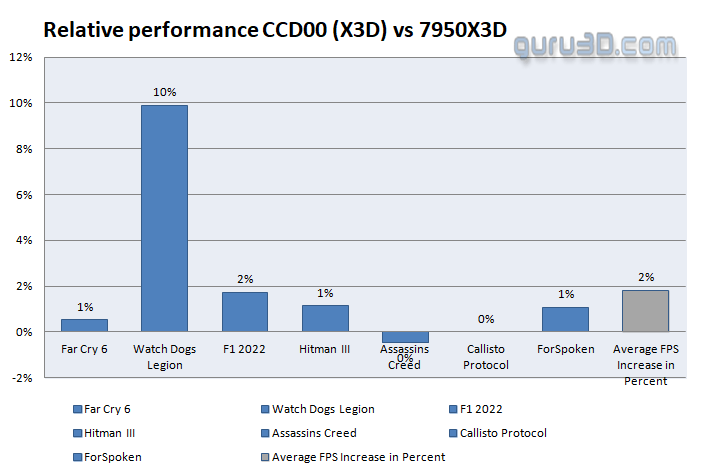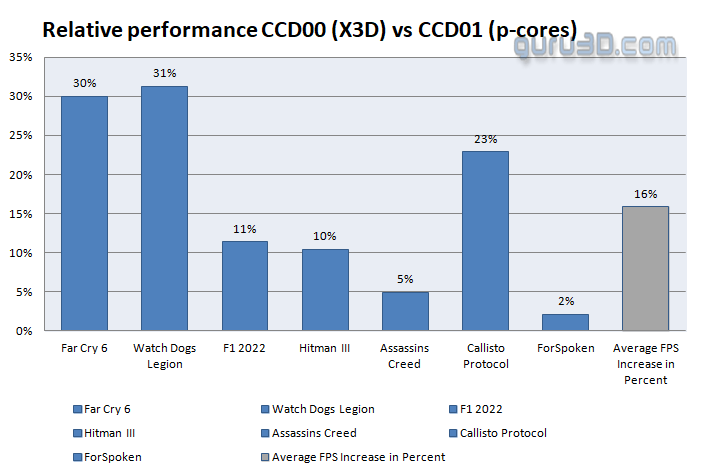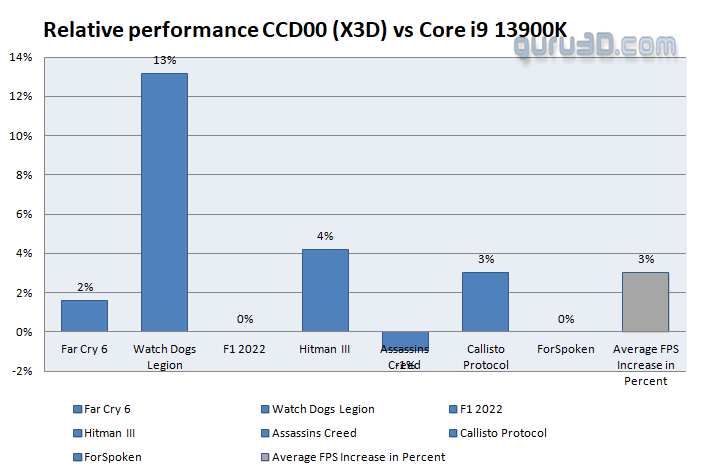Conclusion
Final Words
The end results are, without a doubt exciting in this little experiment. Currently, the 7950X3D is fitted with 8-cores that run a notch slower yet are paired with the X3D cache (CCD00); the other core cluster (CCD01) holds the regular CCD with 8-cores that can run faster, reaching 5.8 GHz. Separate them, and you'll learn that the X3D 8-core CCD works absolutely beautifully with games, sometimes even a notch faster than the 7950X as the reality also is that a twofold of CCDs offer a bit more latency. As such, the 7950X3D does hold the best of both worlds. Of course, the X3D series is all about that extra chunk of L3 cache to boost gaming performance. Which admittedly, works well.
Price and value
The asking price for the Ryzen 9 7950X3D has been kept similar to the 7950X, and if you're a PC gamer then the choice is obvious. So that's a good thing. Overall application performance can be a notch slower, but as the tests have proven, some are now a notch faster.
- Ryzen 9 7950X3D for $699
- Ryzen 9 7900X3D for $599
- Ryzen 7 7800X3D for $449
Gaming performance
The future Ryzen 7 7800X3D features eight CPU cores, or 16-threads with that added 64 MB silicon die of 3DV-Cache. Likely these processors are the full 7950X3D however with CCD1 disabled. The processor is rated at 120 W TDP, with a base frequency of 4.2 GHz and a boost frequency of 5.0 GHz. The application performance of the simulated 7800X3D is relatively similar to the Ryzen 7 7700(X), with some benchmarks showing differential due to a larger cache. But, 7800X3D isn't built for productivity; rather, it's intended for a gaming rig.
Comparing CCD00 (X3D) with its eight cores towards the fully enabled 7950X3D even shows a small win in gaming for the 8-core part.
AMD plans to release the 7800X3D in April, targeting gamers who demand top-notch performance. Notably, the 7800X3D can outperform or match Intels Core i9-13900K in most scenarios. The significant price difference between the two processors is also worth noting, with the 7800X3D priced at $450 compared to the 13900K's $570. However, in multithreaded applications, Intel will tear a hole in the 7800X3D. It is also worth noting that 13700K and 13600K are also worth considering for those looking for affordable options with comparable performance.
Above, you can see the performance differential (in games) in-between the CCD00 (X3D) processors and the CCD01 (performance cores) cluster. The X3D cached cores do make quite a bit of a difference.
And then, if we look at the Core i9 13900K versus the emulated 7800X3D, it's free from latency compared to the 7950X3D and performs even a notch better; at Full HD we measure 4% faster performance overall.
Energy efficiency and heat
The AMD X3D CPU demonstrates the impressive energy efficiency and outperforms competing CPUs in terms of power consumption during gaming. Our testing of the simulated Ryzen 7 7800X3D showed half the power needed compared to say. This reduced power consumption not only benefits the user's power bill but also helps to lower case temperatures and reduces heat during extended gaming sessions. The processor can be cooled with a mainstream LCS cooler perfectly fine, in fact we did that. The release delay for the 7800X3D may be advantageous as it allows time for AMD and its motherboard partners to address any remaining issues and for overclockers to discover new performance-enhancing techniques. Overall, the energy efficiency and anticipated performance of the 7800X3D make it a highly interesting CPU among gamers.
Conclusion
As I conclude, I must admit my utmost excitement to get my hands on an actual real 7800X3D, there's a lot to be excited about. The question arises, should you opt for the future-forward 7800X3D or the tried and tested 7950X3D? The answer here is simple; if you're into content creation with heavy workloads or prefer future-proofing your system, then the 7950X3D is undoubtedly an exceptional choice. However, if your primary intention is gaming and you don't require stringent workload demands, then the 7800X3D could be the processor you need at a more acceptable price level. We hope you liked this little article. And we can't wait to test more X3D processors.
- Sign up to receive a notification when we publish a new article
- Or go back to Guru3D's front page.




